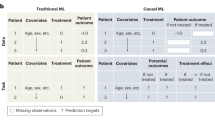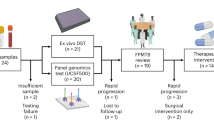Abstract
The overall goal of this study was to provide evidence for the clinical validity of nine genetic variants in five genes previously associated with irinotecan neutropenia and pharmacokinetics. Variants associated with absolute neutrophil count (ANC) nadir and/or irinotecan pharmacokinetics in a discovery cohort of cancer patients were genotyped in an independent replication cohort of 108 cancer patients. Patients received single-agent irinotecan every 3 weeks. For ANC nadir, we replicated UGT1A1*28, UGT1A1*93 and SLCO1B1*1b in univariate analyses. For irinotecan area under the concentration–time curve (AUC0-24), we replicated ABCC2 -24C>T; however, ABCC2 -24C>T only predicted a small fraction of the variance. For SN-38 AUC0-24 and the glucuronidation ratio, we replicated UGT1A1*28 and UGT1A1*93. In addition to UGT1A1*28, this study independently validated UGT1A1*93 and SLCO1B1*1b as new predictors of irinotecan neutropenia. Further demonstration of their clinical utility will optimize irinotecan therapy in cancer patients.
This is a preview of subscription content, access via your institution
Access options
Subscribe to this journal
Receive 6 print issues and online access
$259.00 per year
only $43.17 per issue
Buy this article
- Purchase on Springer Link
- Instant access to full article PDF
Prices may be subject to local taxes which are calculated during checkout

Similar content being viewed by others
References
Innocenti F, Undevia SD, Iyer L, Chen PX, Das S, Kocherginsky M et al. Genetic variants in the UDP-glucuronosyltransferase 1A1 gene predict the risk of severe neutropenia of irinotecan. J Clin Oncol 2004; 22: 1382–1388.
Kim TW, Innocenti F . Insights, challenges, and future directions in irinogenetics. Ther Drug Monit 2007; 29: 265–270.
Hoskins JM, Goldberg RM, Qu P, Ibrahim JG, McLeod HL . UGT1A1*28 genotype and irinotecan-induced neutropenia: dose matters. J Natl Cancer Inst 2007; 99: 1290–1295.
Beutler E, Gelbart T, Demina A . Racial variability in the UDP-glucuronosyltransferase 1 (UGT1A1) promoter: a balanced polymorphism for regulation of bilirubin metabolism? Proc Natl Acad Sci USA 1998; 95: 8170–8174.
Ramirez J, Mirkov S, Zhang W, Chen P, Das S, Liu W et al. Hepatocyte nuclear factor-1 alpha is associated with UGT1A1, UGT1A9 and UGT2B7 mRNA expression in human liver. Pharmacogenomics J 2008; 8: 152–161.
Ritter JK, Kessler FK, Thompson MT, Grove AD, Auyeung DJ, Fisher RA . Expression and inducibility of the human bilirubin UDP-glucuronosyltransferase UGT1A1 in liver and cultured primary hepatocytes: evidence for both genetic and environmental influences. Hepatology 1999; 30: 476–484.
Iyer L, King CD, Whitington PF, Green MD, Roy SK, Tephly TR et al. Genetic predisposition to the metabolism of irinotecan (CPT-11). Role of uridine diphosphate glucuronosyltransferase isoform 1A1 in the glucuronidation of its active metabolite (SN-38) in human liver microsomes. J Clin Invest 1998; 101: 847–854.
Innocenti F, Ratain MJ . Pharmacogenetics of irinotecan: clinical perspectives on the utility of genotyping. Pharmacogenomics 2006; 7: 1211–1221.
Product Information. Camptosar (irinotecan). New York NPUC, July 2012 http://labeling.pfizer.com/ShowLabeling.aspx?id=533.
Iyer L, Das S, Janisch L, Wen M, Ramirez J, Karrison T et al. UGT1A1*28 polymorphism as a determinant of irinotecan disposition and toxicity. Pharmacogenomics J 2002; 2: 43–47.
Han JY, Lim HS, Shin ES, Yoo YK, Park YH, Lee JE et al. Influence of the organic anion-transporting polypeptide 1B1 (OATP1B1) polymorphisms on irinotecan-pharmacokinetics and clinical outcome of patients with advanced non-small cell lung cancer. Lung Cancer 2008; 59: 69–75.
Han JY, Lim HS, Yoo YK, Shin ES, Park YH, Lee SY et al. Associations of ABCB1, ABCC2, and ABCG2 polymorphisms with irinotecan-pharmacokinetics and clinical outcome in patients with advanced non-small cell lung cancer. Cancer 2007; 110: 138–147.
Xiang X, Jada SR, Li HH, Fan L, Tham LS, Wong CI et al. Pharmacogenetics of SLCO1B1 gene and the impact of *1b and *15 haplotypes on irinotecan disposition in Asian cancer patients. Pharmacogenet Genomics 2006; 16: 683–691.
Mathijssen RH, Marsh S, Karlsson MO, Xie R, Baker SD, Verweij J et al. Irinotecan pathway genotype analysis to predict pharmacokinetics. Clin Cancer Res 2003; 9: 3246–3253.
Rosner GL, Panetta JC, Innocenti F, Ratain MJ . Pharmacogenetic pathway analysis of irinotecan. Clin Pharmacol Ther 2008; 84: 393–402.
Innocenti F, Kroetz DL, Schuetz E, Dolan ME, Ramirez J, Relling M et al. Comprehensive pharmacogenetic analysis of irinotecan neutropenia and pharmacokinetics. J Clin Oncol 2009; 27: 2604–2614.
Coate L, Cuffe S, Horgan A, Hung RJ, Christiani D, Liu G . Germline genetic variation, cancer outcome, and pharmacogenetics. J Clin Oncol 2010; 28: 4029–4037.
Innocenti F, Schilsky RL . Translating the cancer genome into clinically useful tools and strategies. Dis Model Mech 2009; 2: 426–429.
van der Bol JM, Mathijssen RH, Creemers GJ, Planting AS, Loos WJ, Wiemer EA et al. A CYP3A4 phenotype-based dosing algorithm for individualized treatment of irinotecan. Clin Cancer Res 2010; 16: 736–742.
Mathijssen RH, de Jong FA, van Schaik RH, Lepper ER, Friberg LE, Rietveld T et al. Prediction of irinotecan pharmacokinetics by use of cytochrome P450 3A4 phenotyping probes. J Natl Cancer Inst 2004; 96: 1585–1592.
de Jong FA, Kehrer DF, Mathijssen RH, Creemers GJ, de Bruijn P, van Schaik RH et al. Prophylaxis of irinotecan-induced diarrhea with neomycin and potential role for UGT1A1*28 genotype screening: a double-blind, randomized, placebo-controlled study. Oncologist 2006; 11: 944–954.
de Bruijn P, Verweij J, Loos WJ, Nooter K, Stoter G, Sparreboom A . Determination of irinotecan (CPT-11) and its active metabolite SN-38 in human plasma by reversed-phase high-performance liquid chromatography with fluorescence detection. J Chromatogr B Biomed Sci Appl 1997; 698: 277–285.
de Bruijn P, Willems EW, Loos WJ, Verweij J, Sparreboom A . Indirect determination of the irinotecan metabolite 7-ethyl-10-O-glucuronyl-camptothecin in human samples. Anal Biochem 2004; 328: 84–86.
Abe T, Kakyo M, Tokui T, Nakagomi R, Nishio T, Nakai D et al. Identification of a novel gene family encoding human liver-specific organic anion transporter LST-1. J Biol Chem 1999; 274: 17159–17163.
Hsiang B, Zhu Y, Wang Z, Wu Y, Sasseville V, Yang WP et al. A novel human hepatic organic anion transporting polypeptide (OATP2). Identification of a liver-specific human organic anion transporting polypeptide and identification of rat and human hydroxymethylglutaryl-CoA reductase inhibitor transporters. J Biol Chem 1999; 274: 37161–37168.
Oshiro C, Mangravite L, Klein T, Altman R . PharmGKB very important pharmacogene: SLCO1B1. Pharmacogenet Genomics 2010; 20: 211–216.
Iusuf D, Ludwig M, Elbatsh A, van Esch A, van de Steeg E, Wagenaar E et al. OATP1A/1B transporters affect irinotecan and SN-38 pharmacokinetics and carboxylesterase expression in knockout and humanized transgenic mice. Mol Cancer Ther 2014; 13: 492–503.
Nozawa T, Minami H, Sugiura S, Tsuji A, Tamai I . Role of organic anion transporter OATP1B1 (OATP-C) in hepatic uptake of irinotecan and its active metabolite, 7-ethyl-10-hydroxycamptothecin: in vitro evidence and effect of single nucleotide polymorphisms. Drug Metab Dispos 2005; 33: 434–439.
Niemi M, Pasanen MK, Neuvonen PJ . Organic anion transporting polypeptide 1B1: a genetically polymorphic transporter of major importance for hepatic drug uptake. Pharmacol Rev 2011; 63: 157–181.
Innocenti F, Cooper GM, Stanaway IB, Gamazon ER, Smith JD, Mirkov S et al. Identification, replication, and functional fine-mapping of expression quantitative trait loci in primary human liver tissue. PLoS Genet 2011; 7: e1002078.
Innocenti F, Grimsley C, Das S, Ramirez J, Cheng C, Kuttab-Boulos H et al. Haplotype structure of the UDP-glucuronosyltransferase 1A1 promoter in different ethnic groups. Pharmacogenetics 2002; 12: 725–733.
Gillis N, Seiser E, Fallon J, Smith P, Innocenti F . Genome-wide analysis of the variation in hepatic protein expression of 22 key drug metabolizing enzymes. American Society of Clinical Pharmacology and Therapeutics (ASCPT) 2014 Annual Meeting (14–16 March 2014). Abstract number 765 and poster number LBII-017.
Peterkin V, Bauman JN, Goosen TC, Paulauskis J, Williams JA, Myrand SP . Genetic variant UGT1A1*93 (-3156 G>A) is predictive of UGT1A1 enzyme activity and protein expression in human liver microsomes. 15th North American Regional International Society for the Study of Xenobiotics (ISSX) Meeting (12-16 October 2008) Abstract number 331.
Cecchin E, Innocenti F, D'Andrea M, Corona G, De Mattia E, Biason P et al. Predictive role of the UGT1A1, UGT1A7, and UGT1A9 genetic variants and their haplotypes on the outcome of metastatic colorectal cancer patients treated with fluorouracil, leucovorin, and irinotecan. J Clin Oncol 2009; 27: 2457–2465.
Nguyen TD, Markova S, Liu W, Gow JM, Baldwin RM, Habashian M et al. Functional characterization of ABCC2 promoter polymorphisms and allele-specific expression. Pharmacogenomics J 2013; 13: 396–402.
Sugiyama Y, Kato Y, Chu X . Multiplicity of biliary excretion mechanisms for the camptothecin derivative irinotecan (CPT-11), its metabolite SN-38, and its glucuronide: role of canalicular multispecific organic anion transporter and P-glycoprotein. Cancer Chemother Pharmacol 1998; 42: S44–S49.
Haenisch S, Zimmermann U, Dazert E, Wruck CJ, Dazert P, Siegmund W et al. Influence of polymorphisms of ABCB1 and ABCC2 on mRNA and protein expression in normal and cancerous kidney cortex. Pharmacogenomics J 2007; 7: 56–65.
Chabot GG, Abigerges D, Catimel G, Culine S, de Forni M, Extra JM et al. Population pharmacokinetics and pharmacodynamics of irinotecan (CPT-11) and active metabolite SN-38 during phase I trials. Ann Oncol 1995; 6: 141–151.
Acknowledgements
This study was supported by funding from NIH/NIGMS U01GM61393, NIH/NCI K07CA140390-01, NIH/NIGMS T32GM086330 and the American Foundation for Pharmaceutical Education. We would like to acknowledge Dr Lana Crona and Mrs Anna Crollman for their help in editing this manuscript, as well as Dr Eric Seiser for his input on the analysis of the liver data in relation to SLCO1B1*1b.
Author information
Authors and Affiliations
Corresponding author
Ethics declarations
Competing interests
Dr Federico Innocenti and Dr Mark J Ratain disclose that they receive royalties from UGT1A1 genotyping. Dr Gary L Rosner discloses that he owns stock in Pfizer. The remaining authors state no conflict of interest.
Additional information
Supplementary Information accompanies the paper on the The Pharmacogenomics Journal website
Supplementary information
PowerPoint slides
Rights and permissions
About this article
Cite this article
Crona, D., Ramirez, J., Qiao, W. et al. Clinical validity of new genetic biomarkers of irinotecan neutropenia: an independent replication study. Pharmacogenomics J 16, 54–59 (2016). https://doi.org/10.1038/tpj.2015.23
Received:
Revised:
Accepted:
Published:
Issue Date:
DOI: https://doi.org/10.1038/tpj.2015.23
This article is cited by
-
Irinotecan-Induced Toxicity: A Pharmacogenetic Study Beyond UGT1A1
Clinical Pharmacokinetics (2023)
-
Integration of DNA sequencing with population pharmacokinetics to improve the prediction of irinotecan exposure in cancer patients
British Journal of Cancer (2022)
-
Individualization of Irinotecan Treatment: A Review of Pharmacokinetics, Pharmacodynamics, and Pharmacogenetics
Clinical Pharmacokinetics (2018)
-
Unusual gastrointestinal and cutaneous toxicities by bleomycin, etoposide, and cisplatin: a case report with pharmacogenetic analysis to personalize treatment
EPMA Journal (2017)
-
Effect of Single Nucleotide Polymorphisms in the Xenobiotic-sensing Receptors NR1I2 and NR1I3 on the Pharmacokinetics and Toxicity of Irinotecan in Colorectal Cancer Patients
Clinical Pharmacokinetics (2016)



